By default, elementary OS has no Desktop. Sure, there’s a pretty wallpaper, but try to create a new folder on the Desktop (or what should be the Desktop), or save an item there, and you’ll find that it just doesn’t exist.
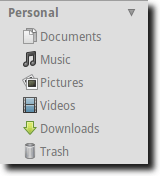
To change this, we’ll need to tweak a couple settings with the Configuration Editor, which we can run from the Terminal or the Run Dialog. To access the Run Dialog, hit Alt-F2 on the keyboard, and then type gconf-editor as shown.
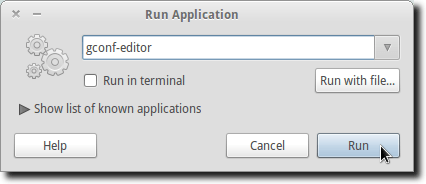
Once the Configuration Editor is running, double click the apps folder in the left sidebar, which will show you all the applications that have their configuration files stored here. Now scroll down to the nautilus entry, double-click it, and then double-click the preferences folder.
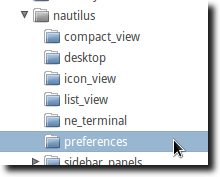
There are two changes we need to make. The first is to have Nautilus actually display the Desktop. To do this, scroll down in the list of Nautilus preferences to the show_desktop option, and make sure it is not selected.

This should immediately change your Desktop, and a row of folders should appear.
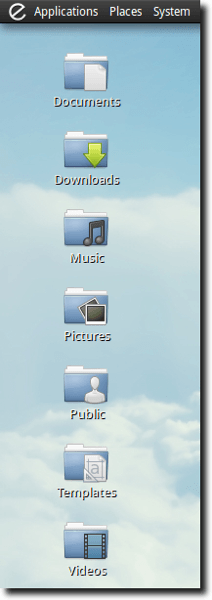
This isn’t quite what we want, as elementary OS is now using our Home directory as the Desktop, which means every file, every folder you would normally place in your Home directory will now appear on the Desktop. If you want this, great. Skip the next step. If, on the other hand, you want an actual Desktop folder, scroll back up in the Nautilus preferences to the desktop_is_home_dir option and make sure it is unchecked.

You’ll likely need to restart Nautilus (either by rebooting or by typing killall -9 nautilus into a Terminal), but the next time Nautilus starts, you’ll have your regular desktop back. Now, when right-clicking, you’ll get the standard Desktop menu.
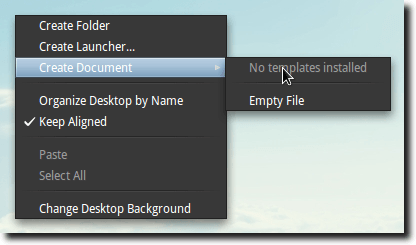
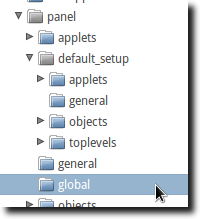
Once here, simply find the locked_down option and uncheck it.

Before we did this, here is the menu that would appear when right-clicking on the Panel.

After unlocking the Panel, this is the menu we get.
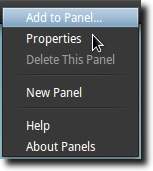
As you can see, we now have more options, including the ability to create more panels, modify their looks, size and behavior of the existing panel, as well as add new items to it.
This last part – adding new items – will allow us to take advantage of something that comes standard with pretty much every Linux distribution, and that is a calendar attached to the Panel clock. In elementary OS, clicking the clock gives you this menu.
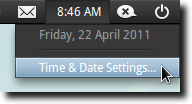
By choosing the Add to Panel option in the menu shown above, we can easily add the Clock applet, which when clicked shows us a calendar.
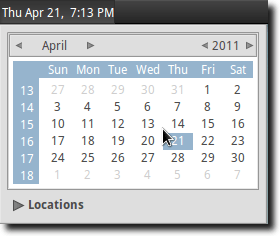
Note: because elementary OS uses the Complete Indicator applet, you’ll have two clocks showing in your Panel. To rectify this, you will likely need to remove the Complete Indicator applet and replace it with the Me Indicator, Messaging Indicator and Session Indicator applets. In the end, however, you should have all the functionality stipped out by default.
And that’s it! As mentioned, there were some choices made for elementary OS that while they won’t limit the behavior of someone experienced enough with Linux to know how to customize it, could potentially be frustrating for inexperienced users. But as you can see, all it takes is a few Configuration Editor tweaks, and you’re back to the freedom you’d expect from Linux.

To change this, we’ll need to tweak a couple settings with the Configuration Editor, which we can run from the Terminal or the Run Dialog. To access the Run Dialog, hit Alt-F2 on the keyboard, and then type gconf-editor as shown.

Once the Configuration Editor is running, double click the apps folder in the left sidebar, which will show you all the applications that have their configuration files stored here. Now scroll down to the nautilus entry, double-click it, and then double-click the preferences folder.

There are two changes we need to make. The first is to have Nautilus actually display the Desktop. To do this, scroll down in the list of Nautilus preferences to the show_desktop option, and make sure it is not selected.

This should immediately change your Desktop, and a row of folders should appear.

This isn’t quite what we want, as elementary OS is now using our Home directory as the Desktop, which means every file, every folder you would normally place in your Home directory will now appear on the Desktop. If you want this, great. Skip the next step. If, on the other hand, you want an actual Desktop folder, scroll back up in the Nautilus preferences to the desktop_is_home_dir option and make sure it is unchecked.

You’ll likely need to restart Nautilus (either by rebooting or by typing killall -9 nautilus into a Terminal), but the next time Nautilus starts, you’ll have your regular desktop back. Now, when right-clicking, you’ll get the standard Desktop menu.

Unlocking the Panel
As mentioned, the Panel is the other locked-down aspect of elementary OS. To unlock it, stay in the Configuration Editor, but navigate to the panel folder, and then the global options.
Once here, simply find the locked_down option and uncheck it.

Before we did this, here is the menu that would appear when right-clicking on the Panel.

After unlocking the Panel, this is the menu we get.

As you can see, we now have more options, including the ability to create more panels, modify their looks, size and behavior of the existing panel, as well as add new items to it.
This last part – adding new items – will allow us to take advantage of something that comes standard with pretty much every Linux distribution, and that is a calendar attached to the Panel clock. In elementary OS, clicking the clock gives you this menu.

By choosing the Add to Panel option in the menu shown above, we can easily add the Clock applet, which when clicked shows us a calendar.

Note: because elementary OS uses the Complete Indicator applet, you’ll have two clocks showing in your Panel. To rectify this, you will likely need to remove the Complete Indicator applet and replace it with the Me Indicator, Messaging Indicator and Session Indicator applets. In the end, however, you should have all the functionality stipped out by default.
And that’s it! As mentioned, there were some choices made for elementary OS that while they won’t limit the behavior of someone experienced enough with Linux to know how to customize it, could potentially be frustrating for inexperienced users. But as you can see, all it takes is a few Configuration Editor tweaks, and you’re back to the freedom you’d expect from Linux.


No comments:
Post a Comment